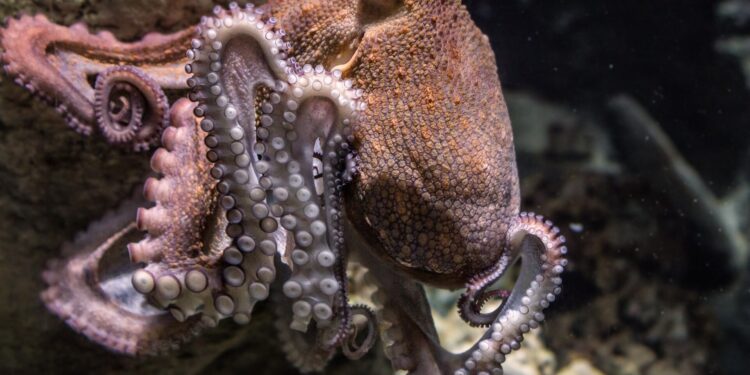Credit: Pixabay/CC0 Public domain
A new study published in Ecology and evolution of nature reveals what happens when octopuses and fish hunt together. It turns out that this relationship between species is more complex than expected.
Animals of the same species often cooperate – working together to achieve a certain goal. But it is relatively rare to observe cooperation between individuals of different species.
A classic example you are familiar with is the close relationship between dogs and humans, whether in the context of sheep herding or hunting. In these situations, the dog and human work together to achieve a goal.
They are mammals. But underwater species also sometimes cooperate. A good example is the joint hunting behavior of moray eels and groupers. The grouper approaches the moray eel and tells it that it wants to hunt. The eel responds in the same way and off it goes.
During these hunting forays, the grouper uses signals to indicate where its prey can hide in the coral matrix. It’s a synergy made from heaven: the eel can scare off prey hiding among the corals, while the grouper patrols above. There is literally no place for prey to hide.
For eels and groupers, the chances of catching their dinner are greatly improved when they hunt together compared to hunting individually.
Who is in charge here?
Although researchers have previously described these behaviors, one question remains unanswered. Who, exactly, is responsible for these species interactions?
Who decides what they will do, where and when? Are the different actors “democratic”, in the sense that they reach some form of compromise, or does one species take the lead and the other simply follows (i.e. they are “despotic”)?
As part of an international collaboration, biologist Eduardo Sampaio and his colleagues studied interspecific interactions between the usually solitary diurnal octopus (Octopus cyanea) and several species of fish, such as the goatfish and the grouper.
The fish and the octopus share a common goal: to increase their hunting efficiency. The traditional view of octopus hunting groups assumed that the octopus was the producer and that the fish simply followed and picked up the remains opportunistically.
With its long, flexible arms, the octopus explores every nook and cranny of the hunting ground, uncovering prey that the fish can then take advantage of. In this scenario, the octopus would be solely responsible for decisions and the fish would simply follow (i.e. it is an exploitative and despotic relationship).
However, when researchers looked closer, it appeared that this relationship may not be as simplistic as previously thought. But without large-scale analysis providing concrete evidence, it is difficult to determine the precise details of how this cooperation works.
What did the new study reveal?
Using sophisticated behavioral analyzes of 3D videos captured during 120 hours of diving, Sampaio and his team discovered that each partner in the interaction plays a specific role. In fact, there was no real leader: they are democrats.
The fish were responsible for exploring the environment and deciding where to move, while the octopus decided if and when to move. Interestingly, controlled experiments showed that octopuses were guided by social information provided by fish.
When paired with blue goatfish, the octopuses’ foraging tactics were more targeted and effective. When associated with blacktip groupers, they were less so. Thus, the nature of the hunting relationship varied depending on the people involved.
The researchers concluded that, overall, success rates in capturing prey were higher for octopuses when they fed with fish partners.
The details revealed by this study suggest that this relationship is much more sophisticated than other inter-species hunting associations examined so far.
Despite the enormous evolutionary gap between these animals (the equivalent of about 550 million years), fish and octopuses show clear signs of social competence and advanced cognition.
More information:
Eduardo Sampaio et al, Multidimensional social influence drives composition-dependent leadership and success in octopus and fish hunting groups, Ecology and evolution of nature (2024). DOI: 10.1038/s41559-024-02525-2
Provided by The Conversation
This article is republished from The Conversation under a Creative Commons license. Read the original article.
Quote: Octopuses work together with fish to hunt – and how they share decisions is surprisingly complex (September 29, 2024) retrieved September 30, 2024 from
This document is subject to copyright. Except for fair use for private study or research purposes, no part may be reproduced without written permission. The content is provided for informational purposes only.



